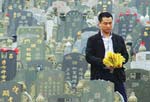Foreign and Military Affairs
Crises open doors for Sino-Japan cooperation
Updated: 2011-04-02 07:06
By Li Xing, Li Xiaokun and Wang Yan (China Daily)
Reconstruction to be major topic of discussion at Beijing-Tokyo Forum
BEIJING / TOKYO - China and Japan should explore opportunities for cooperation in the massive reconstruction job Japan faces in the aftermath of its triple disasters, political and opinion leaders from both countries said on Friday.
Kenichi Matsumoto, special adviser to Japan's cabinet, said Japan will enter an era of reconstruction following the magnitude-9.0 earthquake, deadly tsunami and Fukushima nuclear crisis.
The forum, organized by China Daily and Genron NPO, a Japanese nonprofit think tank, is a major public diplomacy platform for the candid exchange of ideas between Chinese and Japanese political and opinion leaders. Started in 2005, the forum convenes its seventh session in late August in Beijing.
Cooperation between Beijing and Tokyo in Japan's reconstruction is likely to be a major topic at the forum.
"The massive reconstruction work, like that after the Osaka-Kobe earthquake in 1995, might help Japan to break through its decade-long downturn and realize a V-shape recovery," said Wei Jianguo, secretary-general of the China Center for International Economic Exchanges, a high-level business think tank.
Zhao Qizheng, chairman of the Foreign Affairs Commission of the Chinese People's Political Consultative Conference, said Japan's reconstruction coincides with China's effort to transform its growth model from export-driven to increased domestic consumption under its 12th Five-Year Plan.
Matsumoto brought thanks from Japanese Prime Minister Naoto Kan for the Chinese leadership's condolences and China's effort in lending a hand when the Japanese people suffered tremendous losses.
Japan will "do whatever it takes to win the battle" at the Fukushima nuclear plant, Kan said on Friday. And when the nuclear crisis ends: "We will establish a system that can respond to any situation based on the assumption that anything could happen."
The nuclear accident might push countries, including China, to work with Japan to establish stricter standards on nuclear plants, said Yuji Miyamoto, former Japanese ambassador to China.
Tokyo Electric Power Co announced on Thursday that radiation in groundwater surrounding the stricken plant is 10,000 times higher than government safety limits.
However, the operator went back to review its analysis on Friday due to erroneous calculations, the government's nuclear safety agency said.
Japanese authorities said on Thursday that radioactive material was found in beef and groundwater in some areas, raising concerns over possible contamination from the stricken Fukushima nuclear plant.
But an official for the Nuclear and Industrial Safety Agency said that a new test conducted on Friday found no abnormal radiation in beef from Tenei, nearly 70 kilometers from the plant.
Radioactive cesium, once entering the human body, is easily absorbed and distributed throughout. It stays mainly in the soft tissue, especially muscles. Overdoses of radioactive cesium in the body could cause slow and acute injuries, according to the China Atomic Energy Authority.
China banned beef imports from Japan in 2001 due to the outbreak of mad cow disease in the country, and it has not yet lifted the embargo, according to China's General Administration of Quality Supervision and Inspection and Quarantine.
Although radioactive foods are not yet likely to enter the Chinese market, domestic businesses have already carried out preventive measures.
At one Isshin Japanese restaurant in Beijing, a staff member told China Daily that all the raw ingredients used for dishes are produced locally.
Many small Japanese seafood restaurants said their ingredients are produced in Europe or China, reversing previous claims of "imported from Japan". Only a few large restaurants are still using Japanese materials, emphasizing the production dates were before the quake, Guangzhou-based Information Times reported on Thursday.
Shan Juan and AP contributed to this story.
E-paper

Green mission
Tony blair believes China will take a leading role to fight climate change and cut emissions.
Stepping on to success
French connection
Generation gaps
Specials

Have you any wool?
The new stars of Chinese animation are edging out old childhood icons like Mickey Mouse and Hello Kitty.

Fill dad's shoes
Daughter and son are beginning to take over the family business of making shoes.

Virtual memorial
High-Tech touches to traditional tombsweeping festival help environment.




